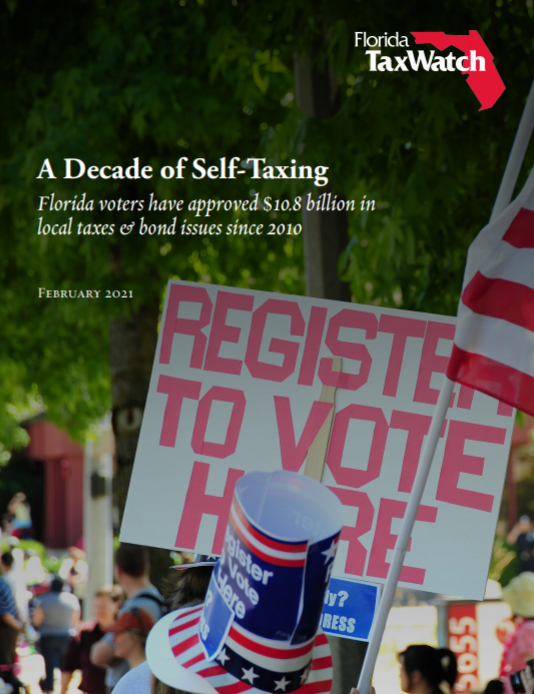A Decade of Self-Taxing
Florida voters have approved $10.8 billion in local taxes & bond issues since 2010

Florida has long relied on its local governments to fund a major portion of its government services. In fact, that reliance is heavier than in all but one other state. Florida’s counties, municipalities, school districts, and special districts provide more than half (52.6 percent) of all state and local revenue collected in the state, trailing only New York (54.7 percent).1 Our state has consistently ranked first or second in this metric for many years.
As a result, while Florida ranks at the very bottom among the 50 states in per capita state revenue collections and tax burdens, our local rankings are higher. Florida collects less in per capita taxes at the state level than any other state and ranks 48th in per capital total state revenue collections. On the other hand, Florida ranks 28th and 16th in local taxes and revenue, respectively. This is often overlooked when Florida’s tax climate is discussed.
The generosity of Florida voters has contributed to the state’s relatively higher local taxes. Floridians have considered 189 tax referenda since calendar year 2010 and passed three-quarters (75.1 percent) of them (see Table 1). Bonds have even fared a little bit better with voters, as they have approved 77.4 percent of the 93 referenda to authorize local governments to issue debt. When examined in terms of potential dollars approved, both tax and bond referenda did even better than when measured as a percentage of the number of referenda approved. For taxes, 78.4 percent of the $6.2 billion in total tax increases proposed were approved. Of the $6.7 billion in bond proposals, 89.6 percent passed.
While the Florida Legislature has passed tax cuts every year since 2009, Floridians have voted to increase their own taxes 142 times, approving taxes worth $4.8 billion on an annual basis. In addition, voters have approved 72 bond issues worth $6.0 billion, providing revenue for large projects that often will require increased taxes to pay off the debt. The amount of the levy (or even the revenue source) is not always specified in the ballot language, but the vast majority of these bonds will be retired with property taxes. While not detailed in this report, there have also been voter-approved revenue hikes for special districts, usually through special assessments. The most popular of these over the last ten years has been for fire and emergency rescue districts. Twenty-three of 37 referenda to increase assessments for fire districts have been approved by local voters since 2010.
Most of the tax increases fall into two major categories—local option sales taxes and ad valorem (property tax) levies for schools. Referenda for these taxes are required by state law. Local governments also occasionally let the voters decide on property taxes for other issues, including conservation and environmental land purchases, children’s services, libraries, cultural and historic projects, and even mosquito control and animal services.
Read the full report below.